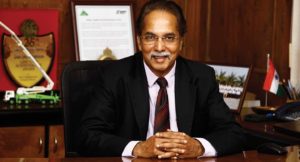Apart from opening its platform to MNCs as a part of the Make in India initiative, the machine tools giant, BFW, is also banking on Indian SMEs to setup CNC (Computer Numeric Control) job-shops and tool rooms on BFW machines, thus creating a revolution in self-employment
“In the last couple of years, we have made significant strides in our journey to be counted as a leading Machine Tool Builder (MTB) in India,” quotes Ravi Raghavan, the managing director and CEO of BFW (Bharat Fritz Werner Limited), one of India’s largest machine tool builders, that is a collaboration between Chennai based Kothari Group and Fritz Werner Werkzeugmaschinen GmbH of West Germany.
Some of its many milestones comprise increasing its product range through the acquisition of a Chennai-based company to offering a wide range of turning products, setting up technology centres in Tier I and Tier II cities across India, apart from its current presence in Pune, Kohlapur and Ahmedabad, and establishing its own R&D centre (Dr. Kalam Centre of Innovation) to research on futuristic technologies in the field of metal-cutting and machine tools. It is also closely monitoring advances in 3D Printing, sensor-based systems & Internet of Things, which it sees as disruptors in India’s manufacturing sector.
Specific to Make in India, while BFW has opened up its platform for MNCs setting up manufacturing operations within India and PSUs building upon their manufacturing capabilities, it is also banking on Indian SMEs & local talent to strengthen the ecosystem. “We would like educated and skilled youth or youth groups to come forward and setup CNC (Computer Numeric Control) job-shops and tool rooms on BFW machines across the country, in turn creating a new revolution in entrepreneurship & self employment,” he shares. BFW sees its most significant stride towards this initiative being its recent workings with its German subsidiary – matec Maschinenbau GmBH, to bring their superior technology to India on a co-development/co-manufacturing model.
The company currently has plants located at Bangalore, Hosur, Chennai and Koengen Germany (through its subsidiary, matec Maschinenbau GmBH). All four plants have added to manufacturing capabilities in diverse manners; The Chennai plant focuses on performance and heavy-duty lathes, while the Hosur plant specializes in machine castings with a built-in capacity of 400MT per month.
For this story, delving further into the nuances of the Make in India campaign and its impact on the Indian manufacturing ecosystem, Raghavan shares his views on where he sees the initiative headed, and what reforms he believes the Government should further bring in, to make the initiative more sustainable in the long run.
On the recent budget
We see the Investment Promotion and Amended Technology Upgradation Fund, which focuses on bringing down costs and improving competitiveness for the domestic Capital Goods sector vis-à-vis imports, as a positive step. We currently await progress in the simplification of procedures to avail various scheme benefits, and are more than equipped to meet the expected surge in manufacturing activities, on account of Make in India Initiatives.
Further, the initiatives taken by the Finance Minister to support upcoming start-ups (financial incentives such as 100 per cent deduction of profits & application of Minimum Alternative Tax) will be a step in the direction of expanding the manufacturing ecosystem throughout the country; a step that BFW will also be a part of.
Additionally, with the renewed Government focus on rural development, we are sure that increased rural spending would be good for the movement of goods & services in the country, hence, drive demand for capital goods. And finally, the focus given towards fiscal discipline in Budget 2016, with an aggressive commitment to bring down fiscal deficits, is what will bring more investments into the country.
The Infrastructure Factor
Infrastructure will be the key to the success of Make in India – improvements will have to be undertaken in existing infrastructure, be it railway corridors, roads, electricity generation and distribution, ports, airports, dams, irrigation, sanitation, access to telecom and the like.
The following actions are the ‘need of the hour’ to make the initiative work: encourage and simplify private participation in infrastructure development, which would ensure rapid pace of such developments, and be beneficial to the manufacturing ecosystem of the country. Secondly, ensure creation of new infrastructure in areas where there is a plaguing infrastructure deficit. While policy formulation and public consensus on the same are presently being built, what remains to be seen is, do we have the capability to implement what we have envisaged? Thirdly, there should be follow-up mechanism to monitor the progress of initiatives in a time bound manner for building a better and more prosperous India.
Future of Manufacturing through Make in India
While the share of manufacturing to India’s GDP has remained stagnant at 16 per cent for over 30 years now, there is definitely a surge of hope within the industry that this will be pushed to over 25 per cent within the year 2022. Land, power, infrastructure, a promising talent pool and a supportive taxation regime are the crucial enablers to industrial growth in the country, and any increase in manufacturing activities would definitely be the outcome of favorable policy measures initiated by the Government to address the same.





